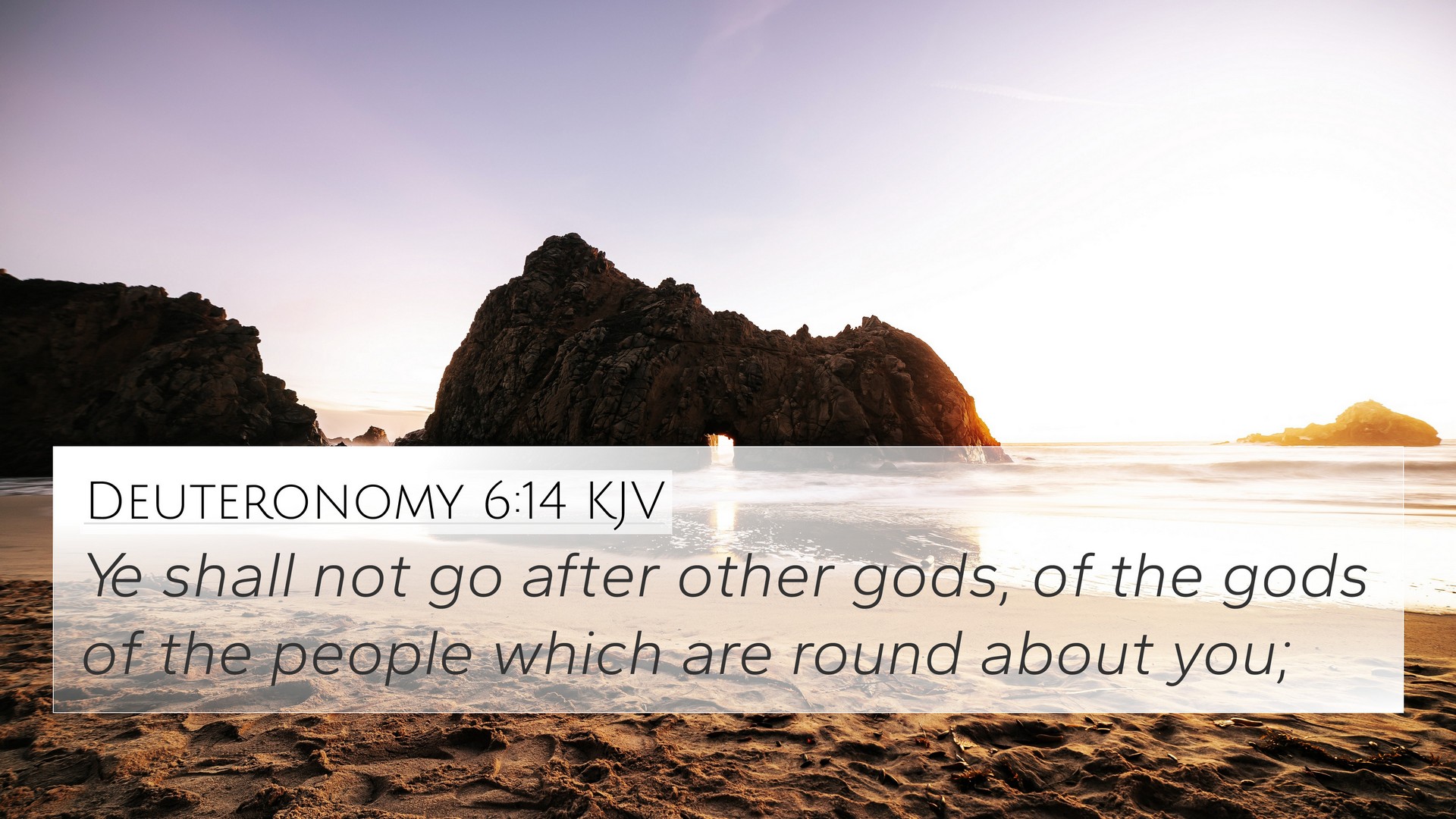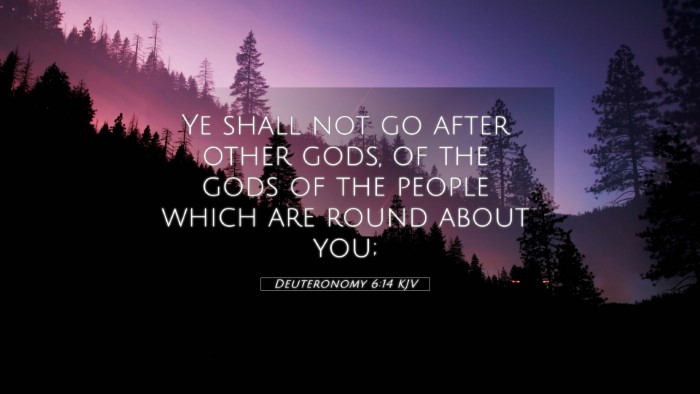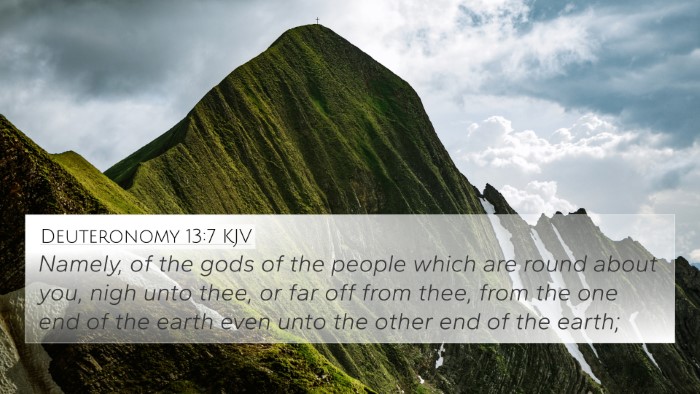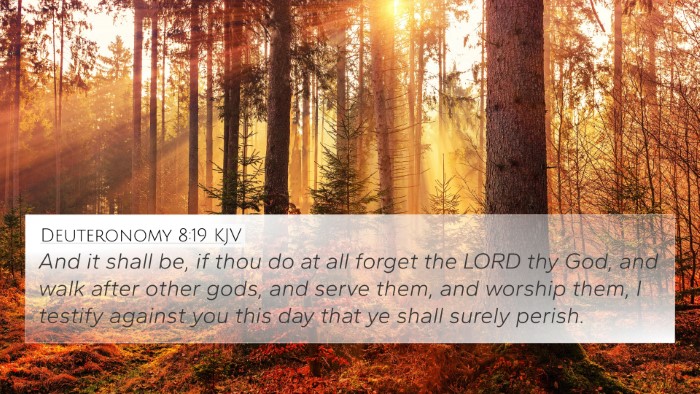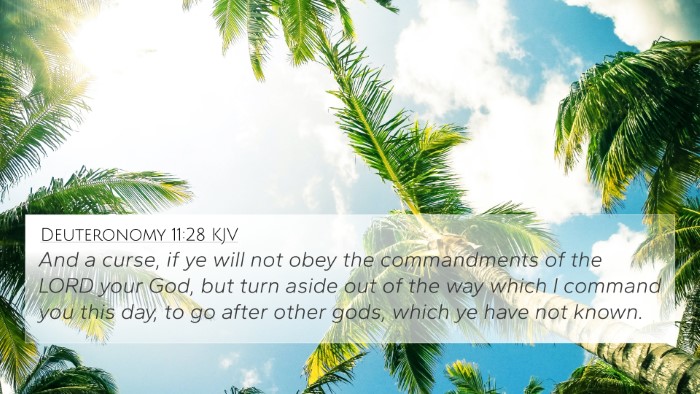Understanding Deuteronomy 6:14
Deuteronomy 6:14 states: "Ye shall not go after other gods, of the gods of the people which are round about you." This command emphasizes the importance of exclusive devotion to Yahweh, warning against the allure of surrounding pagan cultures. Below is a comprehensive interpretation that explores the deeper meaning of this verse through insights gleaned from public domain commentaries, including those by Matthew Henry, Albert Barnes, and Adam Clarke.
Comprehensive Analysis
Deuteronomy 6:14 serves as a crucial directive in the larger context of the Shema, a core declaration of the Israelites' faith. This verse emphatically calls upon the Israelites to reject idolatry and to maintain their commitment to the one true God.
Insights from Commentaries
- Matthew Henry: Henry highlights the dangers of idolatry, emphasizing that the attraction of foreign gods can lead the faithful astray. He notes that the context of this admonition aligns with God’s covenant, stressing that the Israelites should remain distinct in their worship practices.
- Albert Barnes: Barnes reinforces the notion of exclusivity in worship. He interprets the command as a preventative measure against the cultural influences of neighboring nations. Barnes also connects this directive to the overarching theme of fidelity in the covenant relationship between God and Israel.
- Adam Clarke: Clarke notes the historical backdrop that influenced the writing of this verse. He elaborates on the nature of the gods worshiped by surrounding nations, explaining how they often represented various aspects of life and nature, which could entice the Israelites. Clarke advocates for spiritual vigilance against such temptations.
Historical Context
This verse is situated within a broader narrative where God seeks to establish His people as a holy nation. In ancient Israel, the temptation to worship local deities was potent, and the Lord’s commands were designed to safeguard His people's spiritual purity.
Thematic Connections
- Exclusivity of Worship: The call to worship only Yahweh resonates through various parts of the Old Testament, underscoring God's desire for a devoted relationship (see Exodus 20:3-6).
- Consequences of Idolatry: The historical results of worshiping other gods are evident in the narratives throughout Kings and Chronicles, manifesting divine wrath and national calamity.
- Renewal of Covenant: The emphasis on God's laws in Deuteronomy suggests the importance of covenant renewal found in Joshua 24:14-15 and other texts.
Cross-References
When studying Deuteronomy 6:14, one can identify the following cross-references to enhance understanding:
- Exodus 20:3-5 - The prohibition of other gods.
- Joshua 24:14-15 - Commitment to serving Yahweh.
- Isaiah 45:20 - The futility of idols.
- 1 John 5:21 - The warning against idolatry in the New Testament.
- Psalms 81:9 - The call to worship God alone.
- Jeremiah 10:10-11 - Contrast between the living God and idols.
- Ezekiel 14:6 - The call to repentance from idolatry.
Practical Applications
This verse is not merely a historical directive but remains relevant today. Followers of Christ are reminded of their commitment to put God above all else. The task of identifying and turning away from modern idols—anything that takes precedence over God—is a continual journey for believers.
Conclusion
Deuteronomy 6:14 provides essential insights into the nature of our relationship with God and the importance of unwavering devotion. The insights gathered from various commentaries underscore that this is a timeless message, urging believers to engage in a continual examination of their allegiances and commitments. Through the use of cross-referencing Bible texts, we further uncover the depth and breadth of God’s command to worship Him alone.
